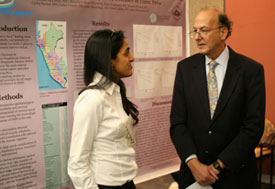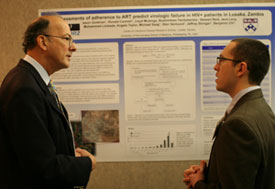Building the next generation of global health leaders
March / April 2012 | Volume 11, Issue 2
Opinion by Dr. Roger I. Glass
Director, Fogarty International Center
"We cannot always build the future for our youth, but we can build our youth for the future." ~Franklin D. Roosevelt

Fogarty director Dr. Roger I. Glass delights in
speaking with early-career doctors, dentists,
scientists and vets during the Fogarty Scholars
and Fellows orientation on the NIH campus
each July.
I'm inspired by these wise words from America's 32nd President. One of my favorite activities as Fogarty director is having the opportunity each summer to meet with some of the rising stars who will become our future global health leaders. Each July I delight in speaking with these early-career doctors, dentists, scientists and veterinarians during our Fogarty Fellows and Scholars orientation here on the NIH campus. I find it invigorating to interact with them and witness their passion, idealism and commitment to improving the health of all of the world's people.
Their youthful enthusiasm is intoxicating and causes me to pause and reflect on my own career in global health. It serves as a reminder of why I decided, all those years ago, to travel to Bangladesh to study the terrible water-borne viruses that are such vicious killers, particularly of children.
I cannot overstate the impact a research fellowship in a developing country can have on an early-career scientist. The experience gives them firsthand exposure to difficult issues on the ground, while providing the opportunity to forge relationships and scientific collaborations that can boost their career trajectory and lead to a lifetime of global health accomplishments.
It's appropriate in this season of renewal that we're entering the next phase of Fogarty's Global Health Program for Fellows and Scholars, one that we believe will strengthen the quality of mentorship and will broaden the research topics studied, to more fully represent the diversity of the global health challenges we face.
I'm delighted to announce that we're awarding about $20.3 million over five years to enhance and expand this effort. By forming a network of 20 U.S. academic institutions with substantial experience in global health research, I'm confident our alumni will be well-equipped to succeed in the global arena and become the next generation of global health leaders. (See the related article, $20M awarded to establish research training network.)

The youthful enthusiasm of Fogarty Scholars
and Fellows is intoxicating, according to Fogarty
director Dr. Roger I. Glass.
With the rising tide of developing-country deaths from chronic, non-communicable diseases, it's vital that we develop scientific expertise in a wider span of health problems, from genetics to geriatrics, from cancer and diabetes to heart disease. At the same time, we must continue to build capacity in the longstanding global health topics of HIV/AIDS, malaria and TB. We must broaden our net to recruit early-career dentists, cardiologists, oncologists, neurologists, behavioral scientists, engineers, health economists and others who can help us address the full range of global health needs.
Since 2004, more than 500 Fogarty Fellows and Scholars have been supported on one-year mentored clinical research experiences at 28 top-ranked research sites in 15 countries. In 2010, the Fulbright Program formed a partnership with Fogarty, joining more than a dozen NIH Institutes and Centers in supporting the Fellows and Scholars initiative.
From these modest investments, we have seen great returns. Participants have published more than 300 articles in peer-reviewed journals and have presented research findings at numerous scientific meetings. Many have remained engaged in specific research questions important to their host countries long after the fellowships have ended - developing toolkits, starting charities to provide funding and continuing to share their expertise from afar. Several alumni have already secured independent NIH funding to continue their global health studies, one of our highest measures of success.
I look forward to meeting the next class of Scholars and Fellows as they embark on their research training experiences. While we continue to "build our youth for the future," my hope is that it will be a future that offers a long and healthy life for all the world's people.
More Information
To view Adobe PDF files,
download current, free accessible plug-ins from Adobe's website.